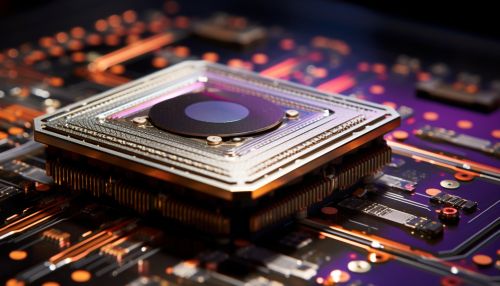Quantum Operations
Introduction
Quantum operations, also known as quantum gates or quantum transformations, are the fundamental building blocks of quantum computing. They are the quantum analogue of classical logic gates and are used to manipulate quantum states in a quantum computer. Quantum operations are unitary transformations, meaning they preserve the length of state vectors in the complex vector space that quantum states inhabit.


Quantum States and Qubits
In quantum computing, information is stored in quantum states, which are represented by qubits. A qubit is the quantum analogue of a classical bit, but unlike a classical bit which can be either 0 or 1, a qubit can be in a superposition of states, meaning it can be in state 0, state 1, or any combination of both. This superposition of states is one of the key features that gives quantum computers their computational power.
Quantum Operations
Quantum operations are used to manipulate the states of qubits in a quantum computer. They are represented by unitary matrices, which are complex-valued matrices that preserve the length of vectors when applied. This property is crucial for maintaining the normalization condition of quantum states, which states that the sum of the probabilities of all possible outcomes of a quantum measurement must equal one.
There are several basic quantum operations that are used in quantum computing, including the Pauli operations, the Hadamard operation, and the phase shift operations. These operations can be combined to form more complex operations, and are used to construct quantum algorithms.
Pauli Operations
The Pauli operations are a set of three quantum operations that are represented by the Pauli matrices. They are named after the physicist Wolfgang Pauli, who introduced them in the context of quantum mechanics. The Pauli operations are:
- The X operation, also known as the bit-flip operation, which flips the state of a qubit from 0 to 1 and vice versa.
- The Y operation, which is a combination of a bit-flip and a phase-flip operation.
- The Z operation, also known as the phase-flip operation, which flips the phase of a qubit.
Hadamard Operation
The Hadamard operation is a quantum operation that puts a qubit into a superposition of states. It is represented by the Hadamard matrix, and when applied to a qubit, it creates a state that is an equal superposition of the 0 and 1 states. The Hadamard operation is often used at the beginning of quantum algorithms to create a superposition of all possible input states.
Phase Shift Operations
Phase shift operations are quantum operations that change the phase of a qubit. They are represented by diagonal matrices, and include operations such as the S operation and the T operation. Phase shift operations are used in quantum algorithms to introduce relative phases between different states in a superposition.
Quantum Gates
Quantum operations are often referred to as quantum gates, especially when they are used in the context of quantum circuits. A quantum circuit is a sequence of quantum gates, and represents a quantum algorithm. Quantum gates are usually depicted as symbols on a line representing a qubit, with the order of the gates on the line indicating the order in which they are applied.
Quantum Operations and Quantum Algorithms
Quantum operations are the building blocks of quantum algorithms. They are used to manipulate the states of qubits in a quantum computer in order to perform computations. Quantum algorithms often make use of the unique properties of quantum operations, such as their ability to create superpositions and entanglement, to solve problems more efficiently than classical algorithms.
Some of the most well-known quantum algorithms include Shor's algorithm for factoring large numbers, and Grover's algorithm for searching unsorted databases. These algorithms make use of quantum operations to achieve a significant speedup over their classical counterparts.
Conclusion
Quantum operations are a fundamental part of quantum computing. They are the tools that allow us to manipulate quantum states and perform computations on a quantum computer. Understanding quantum operations is crucial for understanding how quantum computers work and how to program them.
